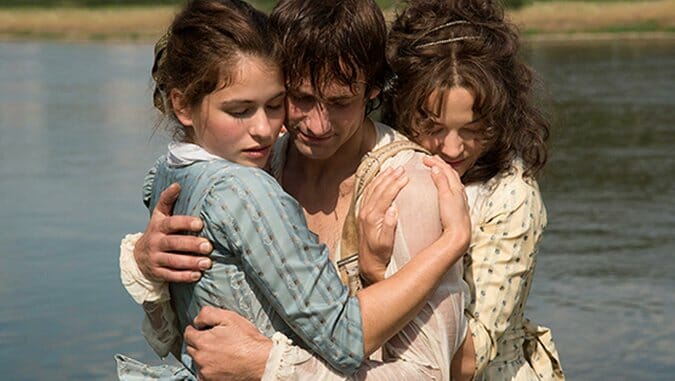Beloved Sisters

Beloved Sisters, Germany’s official submission to the Academy Awards’ Best Foreign Language Film category, is a beautifully photographed historical drama patiently chronicling a love triangle between two aristocratic sisters and their poet-playwright-philosopher lover, Friedrich Schiller. With such a salacious story at its core, it would be easy to dismiss as another bodice-ripping romance in the same vein as Dangerous Liaisons, Valmont or Dangerous Beauty. Instead, the film—as helmed by veteran German TV and film writer-director Dominik Graf—is a heady examination of modern notions of love and societal gender roles. Although Beloved Sisters does dabble occasionally in melodrama throughout its unhurried 170 minutes, Graf keeps the focus on mental and creative attraction rather than simply emphasizing all the sex.
Set on the cusp of both the Weimar Classicism literary movement and the French Revolution, Beloved Sisters posits a world in the midst of a socio-political sea change. The young, naive Charlotte (Henriette Confurius), nicknamed “Lollo” by her family, is shuttled to Weimar, where her godmother (Maja Maranow) will mentor her in finding a husband. While in the city, Lollo makes the acquaintance of Friedrich Schiller (Florian Stetter), a smart, dashing pauper-playwright who’s already achieved a modicum of fame. While the attraction is instant, there’s one thing that Schiller lacks as a proper match: money.
Lollo’s aristocratic family is on the edge of ruin, precipitated by the untimely death of its patriarch. Her sister Caroline (Hannah Herzsprung) has played her part, attempting to stabilize their financial situation by marrying Baron von Beulwitz, at 16—obviously for his money. Now, during the summer of 1788, when Schiller visits the von Lengefelds at their home in Rudolstadt, the sisters’ mother (Claudia Messner) isn’t keen on Lollo marrying a poor writer, nor does she much like of the odd relationship developing between her daughters and their guest.
The trio grows intimately close during this slow, languid summer in the country. They craft a secret written language to convey their innermost thoughts and feelings without reprisal from those who may intercept the letters and disapprove of their bonding. The missives between Lollo, Caroline and Schiller are filled with pledges to love each other forever—equally and unconditionally. When read aloud by Stetter, Herzsprung and Confurius, the passion is convincing.
It’s also at Rudolstadt that Beloved Sisters takes a misstep into Harlequin territory. Schiller, who can’t swim, saves a little girl from drowning. Afterwards, Caroline insists that Schiller strip naked to dry his clothes, and the sisters keep him warm, covering him with their clothed bodies as together they lay against a tree, warming in the sun. The scene is but one cheesy example; eye-rolling moments abound, particularly the cursory visual treatment of the French Revolution, in which blood slowly seeps down a cobblestone road, which feels like Graf just read A Tale of Two Cities and lifted one of its defining images wholesale.
-

-

-

-

-

-

-

-

-

-

-

-

-

-

-

-

-

-

-

-

-

-

-

-

-

-

-

-

-

-

-

-

-

-

-

-

-

-

-

-








































